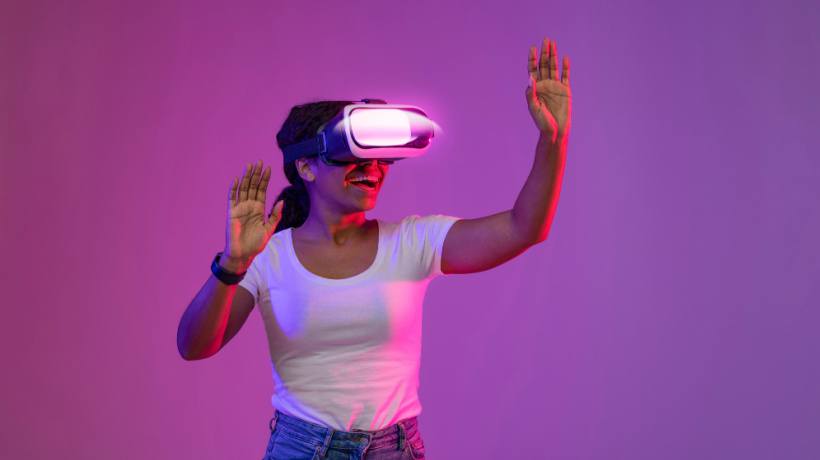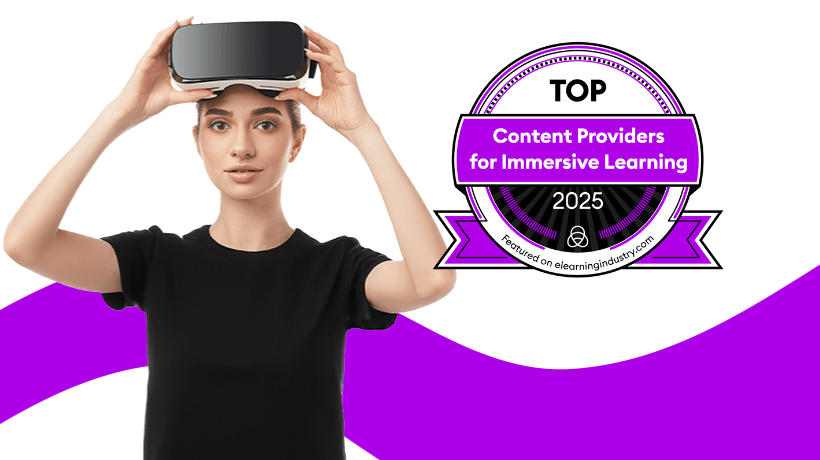Immersive Learning Is Active Learning
Imagine this: you are standing in front of a group of your colleagues, trying your best to train them on the latest regulatory update. One of them is frowning, and you know his mind is on the work piled on his desk. One looks at her watch, trying to see how long to go before lunch. And worst of all, one of them has his hand inching towards his phone buzzing on the table. "Don’t do it!" you want to shout, because you know his attention will be lost entirely when he looks at his phone. Whoever said kids have short attention spans should try corporate training with adults.
So, what is immersive learning? Simply put, immersive learning is active learning. Immersive learning seeks to do away with the traditional form of unidirectional learning and engage learners to actively participate in their learning by interacting and experimenting with an interactive learning environment. Currently, many technologies facilitate immersive learning experiences, such as Virtual Reality (VR), Augmented Reality (AR), and 360-degree videos. However, even simulations or gamification can be considered immersive learning, as long as they provide a high degree of learner interaction.
Fact Or Fiction? Common Misconceptions About Immersive Learning
1. Production Is Expensive And Complex—Only Companies With Big Budgets Can Afford It
This is fiction. Recreating scenes, like a disaster zone for first responders’ training, might require high production quality, but for most organizations, creating immersive media is more affordable than we think. For example, a real estate agency can use a simple camera and 360-degree video to film and develop virtual homes to train agents on how to give a walk-through and interact with objects in the house. Additionally, existing training videos or tutorials can be repurposed and made into immersive media by increasing interactivity through an eLearning authoring tool, thus making immersive learning affordable.
2. Learners Forget 70% Of Training Content Within 24 Hours
According to a study by Accenture, this is a fact—at least for existing training methods! Yet, for many companies, there is still no sense of urgency to reimagine learning for their employees. A PwC study has shown that learners engaging in immersive learning via VR are four times more focused, four times quicker to complete training, and 275% more confident in applying what they’ve learned. Practical training can lead to better performance, improved customer service, and increased sales. Ultimately, if companies train their staff more effectively and efficiently, this will likely lead to increased profitability and market share.
3. Employees May Lose Sight Of Their Learning Objectives
Some managers are concerned that immersive technology will become a distraction. However, this is most likely fiction, and will only occur because of poor eLearning design where characters and storylines are exaggerated to the point of being distracting. In fact, a well-designed immersive learning program will allow narratives to gradually unfold based on learners’ actions, thereby capturing learners’ interest and retaining their attention throughout the course.
4. Immersive Learning Works Only For Soft Skills
Fiction! Immersive learning can engage learners and positively impact hard and soft skills training. Take the construction industry as an example, which requires many complex skills. Immersive training can include interacting with the expensive objects and tools commonly used in construction while building real-world safety protocols and processes.
Meanwhile, in the soft skills industry, immersive learning can be deployed for communications and leadership training, amongst others. For instance, in role-play simulations with virtual human characters, learners can practice navigating real-world conversations, such as providing feedback, building trust, and demonstrating empathy during difficult conversations.
5 Ways To Kickstart Your Immersive Learning Training Journey
1. Gamification
Everyone is familiar with games. Whether board games, computer games, or mobile games, games are a compelling way to engage people—who doesn’t love playing a good game? When used in training, it can motivate learners to want to explore and do more, challenge them, and most importantly, enable them to enjoy the learning process. Vital elements in well-designed gamification include competition, leaderboards, levels, avatars, rewards, and recognition.
2. Story-Based Learning
Incorporating an appealing and realistic story in your training will enable learners to relate better and build a stronger emotional connection with the learning material. This method is beneficial for areas that require a high degree of empathy, such as HR, leadership, negotiation, or traditionally dry and technical topics such as finance, legal, or compliance.
3. Branching Scenarios
With branching scenarios, the narrative evolves, and different paths open up depending on actions taken by learners. Not only does this method incite curiosity and encourage deep thinking, but learners will also feel empowered to make decisions and learn from the consequences of their actions in a safe environment. An example of branching scenarios can be seen in training for patient management. Learners will be given patient information and work to investigate symptoms, diagnose, and treat their patients. Patient progression of symptoms and treatment response will depend on learners’ decisions.
4. Augmented Reality
Augmented Reality alters real-world environments by adding virtual objects on top of it, and it combines the familiarity of the physical world with an immersive digital experience. Pokémon Go is a famous example of AR technology in the gaming world. An automotive company, for example, can train their mechanics or sales staff on the different car parts by overlaying the car parts on an actual model, including instructions, and allowing learners to interact with the pieces through AR and a mobile app.
5. Virtual Reality
Virtual Reality allows learners to experience deep immersion in a simulated environment. Using VR, learners can interact with virtual characters, pick up objects and move them or explore a location as if they were physically there. Using 360-degree video to capture a scene from all angles, learners can train in a laboratory, visit engineering sites and even prepare for emergencies. Trainers can decide whether to provide learners with guided exploration or allow them to freely discover the content independently.
Conclusion
Immersive learning comes with a wide range of benefits. If done well, it is an excellent training method to engage learners, achieve learning outcomes and deliver a better ROI for your training budget. It sounds intimidating to implement—but that is yet another fiction! On the contrary, with the proper framework and guidance, immersive learning journeys can be customized based on your organization’s readiness and desired goals.









